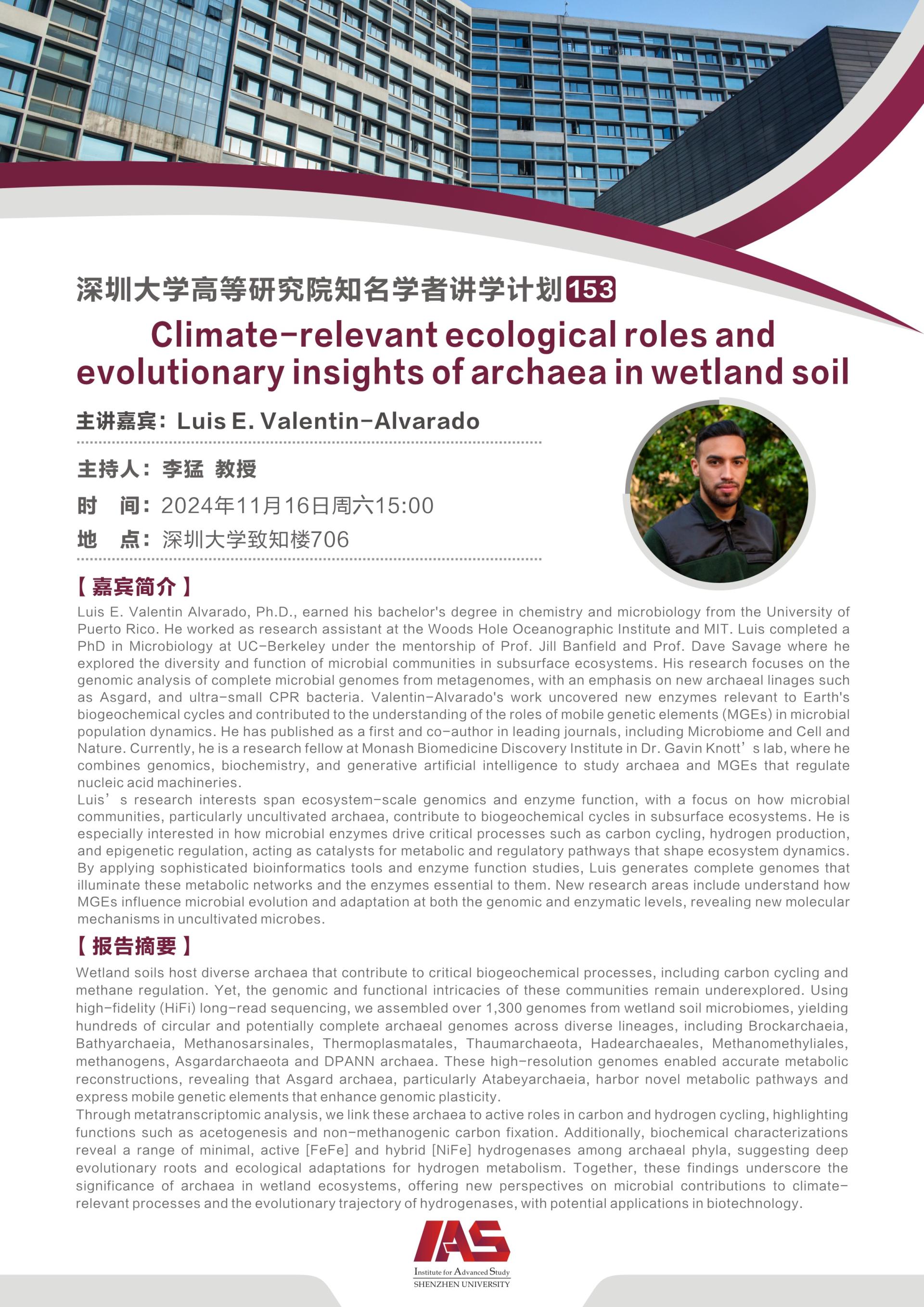报告主题:Climate-relevant ecological roles and evolutionary insights of archaea in wetland soil
主讲人:Luis E. Valentin-Alvarado
主持人:李猛教授
时间:2024年11月16日周六15:00
地点:深圳大学致知楼706
嘉宾简介:
Luis E. Valentin Alvarado, Ph.D., earned his bachelor's degree in chemistry and microbiology from the University of Puerto Rico. He worked as research assistant at the Woods Hole Oceanographic Institute and MIT. Luis completed a PhD in Microbiology at UC-Berkeley under the mentorship of Prof. Jill Banfield and Prof. Dave Savage where he explored the diversity and function of microbial communities in subsurface ecosystems. His research focuses on the genomic analysis of complete microbial genomes from metagenomes, with an emphasis on new archaeal linages such as Asgard, and ultra-small CPR bacteria. Valentin-Alvarado's work uncovered new enzymes relevant to Earth's biogeochemical cycles and contributed to the understanding of the roles of mobile genetic elements (MGEs) in microbial population dynamics. He has published as a first and co-author in leading journals, including Microbiome and Cell and Nature. Currently, he is a research fellow at Monash Biomedicine Discovery Institute in Dr. Gavin Knott’s lab, where he combines genomics, biochemistry, and generative artificial intelligence to study archaea and MGEs that regulate nucleic acid machineries.
Luis’s research interests span ecosystem-scale genomics and enzyme function, with a focus on how microbial communities, particularly uncultivated archaea, contribute to biogeochemical cycles in subsurface ecosystems. He is especially interested in how microbial enzymes drive critical processes such as carbon cycling, hydrogen production, and epigenetic regulation, acting as catalysts for metabolic and regulatory pathways that shape ecosystem dynamics. By applying sophisticated bioinformatics tools and enzyme function studies, Luis generates complete genomes that illuminate these metabolic networks and the enzymes essential to them. New research areas include understand how MGEs influence microbial evolution and adaptation at both the genomic and enzymatic levels, revealing new molecular mechanisms in uncultivated microbes.
报告摘要:
Wetland soils host diverse archaea that contribute to critical biogeochemical processes, including carbon cycling and methane regulation. Yet, the genomic and functional intricacies of these communities remain underexplored. Using high-fidelity (HiFi) long-read sequencing, we assembled over 1,300 genomes from wetland soil microbiomes, yielding hundreds of circular and potentially complete archaeal genomes across diverse lineages, including Brockarchaeia, Bathyarchaeia, Methanosarsinales, Thermoplasmatales, Thaumarchaeota, Hadearchaeales, Methanomethyliales, methanogens, Asgardarchaeota and DPANN archaea. These high-resolution genomes enabled accurate metabolic reconstructions, revealing that Asgard archaea, particularly Atabeyarchaeia, harbor novel metabolic pathways and express mobile genetic elements that enhance genomic plasticity.
Through metatranscriptomic analysis, we link these archaea to active roles in carbon and hydrogen cycling, highlighting functions such as acetogenesis and non-methanogenic carbon fixation. Additionally, biochemical characterizations reveal a range of minimal, active [FeFe] and hybrid [NiFe] hydrogenases among archaeal phyla, suggesting deep evolutionary roots and ecological adaptations for hydrogen metabolism. Together, these findings underscore the significance of archaea in wetland ecosystems, offering new perspectives on microbial contributions to climate-relevant processes and the evolutionary trajectory of hydrogenases, with potential applications in biotechnology.



